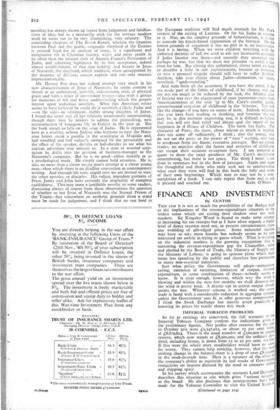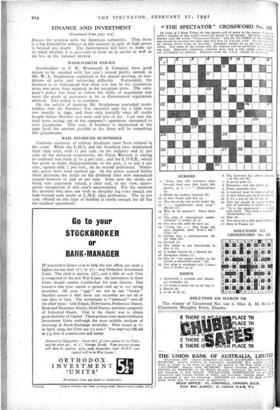FINANCE AND INVESTMENT
By CUSTOS
Tins year it is not so much the possibilities of the Budget itself as the implications of the revenue-expenditure situation in the widest sense which are casting their shadow over the stock markets. Sir Kingsley Wood is bound to make some attempt at increasing his tax receipts but as I have often argued, a higher level of direct taxation need not, in present circumstances, cause any wobbling of gilt-edged prices. Some industrial equities may have to take more knocks but nobody seems to be very interested yet awhile in trying to guess which. What is weighing on the industrial markets is the growing recognition that in narrowing the revenue-expenditure gap the Chancellor, aided and abetted by the Board of Trade, the Ministry of Supply and the Ministry of Labour, is going to sponsor plans which must mean less spending by the public and therefore less production in many non-essential industries.
Just what policy the Government will adopt—compulsory saving, extension of rationing, limitation of output, rationed expenditure, or some combination of these—nobody seems to know. It is clear enough, however, which way the wind is blowing and within the next few months we shall discover that the wind is pretty keen. A drastic cut in cotton output already points the way. Whatever scheme is worked out, the cotta trade is faced with a considerable reduction in aggregate earnings unless the Government sees fit to offer generous compensation I think the Stock Exchange has merely acted prudently is lowering its prices for textile shares this week.
IMPERIAL TOBACCO PROBLEMS So far as earnings are concerned, the full accounts of the Imperial Tobacco Company confirm the indications given in the preliminary figures. Net profits after taxation for the year to October 31st were £1,347,012, or about 15 per cent. lower, at £8,879,814. There is the usual transfer of £5oo,000 to genersl reserve, which now stands at £8,500,000, and the ordinary divi- dend, including bonus, is down from 23 to 20 per cent. tax free. If that were the whole story stockholders would have no cause for worry. They cannot help noticing, however, that the matt striking change in the balance-sheet is a drop of over £8,000, in the stock-in-trade item. Here is a measure of the effect 01 the company's ability to replenish its leaf stocks of Government restrictions on imports dictated by the need to conserve dollars and shipping space. In his survey which accompanies the accounts Lord Dulvertga describes this situation as one which gives " serious concern to the board. He also discloses that arrangements have he'll made for the Tobacco Controller to visit the United States to (Continued on page 214) FINANCE AND INVESTMENT (Continued from page 2r2)
discuss the position with the American authorities. That there is a big demand for tobacco in this country in spite of high prices is beyond any doubt. The Government will have to make up its mind whether it is necessary to force us to smoke as well as eat less in the national interest.
WOOLWORTH POLICY Stockholders in F. W. Woolworth & Company have good reason to be satisfied with last year's record profits earned, as Mr. W. L. Stephenson explained at the annual meeting, in con- ditions of great and increasing difficulty. Fortunately, the business is so widespread that what was lost in the evacuation areas was more than regained in the reception areas. The com- pany's policy has been to follow the shifts of population and serge the needs of customers as far as Government regulations allowed. This policy is to continue.
On the subject of taxation Mr. Stephenson reminded stock- holders that the Purchase Tax operated only for a little over two months in 1940, and then only partially since all stocks bought before October 2ISI were sold free of tax. Last year the total taxes arising out of the company's operations amounted to over £5,000,000. This year, if business is maintained at the 1940 level, the amount payable to the State will be something like £ 0,000,000.
RAIL DIVIDEND SURPRISES Cautious estimates of railway dividends have been refuted in the event. While the L.M.S. and the Southern have maintained their 1939 rates, with 14 per cent, on the ordinary and a per cent on the deferred respectively, the Great Western is raising its ordinary rate from 31 to 4 per cent., and the L.N.E.R., which has given so many disappointments in the past, is to pay 2 per cent., against only per cent., on its second preference. Natur- ally, prices have been marked up. At the prices quoted before these decisions the yields on the dividend rates now announced ranged between II and 16 per cent. Even now the stocks are being very cautiously valued, a clear and, in my view, appro- priate recognition of this year's uncertainties. For the moment the investor who does not wish to shoulder big risks should not look beyond such stocks as L.M.S. 1923 preference. The 10 per cent. offered on this type of holding is surely enough for all but the hardiest speculators.































 Previous page
Previous page